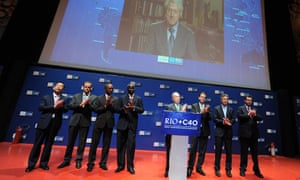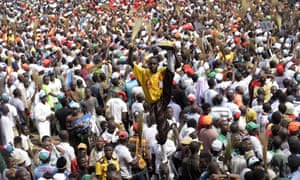Once hailed as “the man who tamed Nigeria’s most lawless city”, Babatunde Fashola has now found himself at the centre of a corruption scandal that threatens to mar the new government’s attempts to present a clean image.
Since stepping down as governor of Lagos in May after a maximum two terms in office, Fashola has been confronted with allegations of misuse of finances. He stands accused of awarding hugely inflated contracts and leaving large debts of over N400bn ($2.1bn ) to his successor, Akinwunmi Ambode.
Fashola has denied the allegations, describing the claims as “manipulated and unsubstantiated”. Meanwhile, some of his supporters have suggested the accusations are part of a political campaign by the former governor’s opponents to prevent him being awarded a top job in the new government of President Muhammadu Buhari, yet to be formed more than three months after he was inaugurated.
Fashola was once seen as a shining light amongst a new breed of Nigerian politicians thanks to his honest and businesslike approach to governance.
When the 2015 elections came around, Buhari called on the Lagos city governor for help and appointed him head of his campaign’s finance committee. In return, many expected the former governor to be awarded a significant role in the new government.
The centrepiece of the Buhari campaign was a renewed pledge on the war against corruption, with the then presidential candidate declaring at a rally in March that his primary goal if elected would be to kill corruption before it “kills the nation”. Fashola’s apparently incorruptible image lent the campaign some much needed authenticity.
Now, this image threatens to be severely undermined.

The Fashola Years
A lawyer by trade, Fashola’s first break in politics came in 2002 when Bola Tinubu, then governor of Lagos, appointed him chief of staff. A few years later, Fashola was picked as Tinubu’s successor, and was comfortably elected as city governor in 2007, under the banner of the Action Congress of Nigeria (ACN).Questions were asked about the process through which Fashola had been chosen for the role, but as political analyst Mark Amaza said at the time: “Godfatherism in Nigeria is very strong. There’s hardly any public office holder that’s without one.”
As governor, Fashola carried out far-reaching reforms in a city with an estimated population of 15-21 million and a GDP of some $50bn – if Lagos were a country its GDP alone would make it Africa’s seventh biggest economy.
The clearing up of areas like Oshodi – previously a haven for armed robbers, local thugs known as “area boys” and notoriously bad traffic – elevated Fashola to a height previously unseen in Nigerian politicians.
“It is [his] acute awareness of the linkage and interdependence between the quality of promises made, and the quality of service to fulfil and deliver them, that has resulted in the remarkable success of The Fashola Years in Lagos State,” wrote Tam Fiofori in an article for Nigeria’s This Day newspaper.
Under Fashola’s rule, Lagosians witnessed improvements in vital sectors including education, infrastructure, public safety and security, whilst special attention was also paid to increasing tax revenue, which now accounts for a majority of the state’s income.
“Fashola preached transparency in government and was a role model in public administration,” said Simon Kolawole, former editor of This Day.

But the governor’s tenure was not without its controversies. Mass clearances of slums under his “urban renewal programme” left thousands of low-income citizens without homes, while the city’s business and political elite benefitted from redevelopment contracts.
Allegations
Within weeks of leaving the governor’s office in May, allegations of financial and personal impropriety began to surface. Fashola was said to have spent 78.3m naira on the upgrade of his official website, 139m naira on the drilling of two boreholes at the government secretariat and is accused of awarding a 640m naira contract to German engineering firm Julius Berger for the reconstruction of a car park and other associated works at the Lagos House Marina, his official residence.Civil society organisation The Coalition Against Corrupt Leaders (Cacol) have led calls for Fashola to be investigated, and the group has forwarded eight petitions to the Economic and Financial Crimes Commission and Independent Corrupt Practices and Related Offences Commission detailing the allegations.
Cacol’s executive director Debo Adeniran has said that the Lagos State government under Fashola saw “frivolous spending on white elephant projects, lack of due process in budget implementation as well as inflation of costs in contract awards”.
For his part, Fashola has penned an official rebuttal titled “When you wrestle with a pig, the pig gets happy and you get dirty”, in which he called the claims “distorted allegations without evidence”.
While the veracity of the allegations remains to be seen, some observers trace Fashola’s current troubles to his fractious relationship with his former godfather, Tinubu.
There were signs of rift between these two Lagos bigwigs as early as 2009, when Tinubu was thought to be unhappy with Fashola’s unwillingness to toe his line. There were even rumours that Fashola might be impeached.
This dispute seemed to simmer down, and Tinubu endorsed Fashola for a second term in 2011, saying: “I am the pathfinder. He is the navigator. I am the one that identified the talent”.
But today relations between the two former governors appears to still be raw,
Arousing suspicions that the corruption allegations – whether true or not – are linked to a behind-the-scenes wrangle for power.
It’s usual for a flurry of corruption charges to be levelled at outgoing politicians, but Buhari will be particularly keen for these to be proved wrong – and swiftly – so he can bring Fashola into the fold. The former governor is still a seen as a credit to the APC government, and as Amaza puts it, “Fashola is actually effective despite all his shortcomings and his popularity will bring the Buhari administration plenty of goodwill.”
A version of this article first appeared on African Arguments

No comments:
Post a Comment